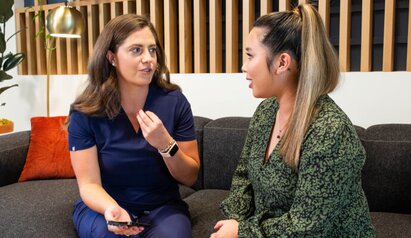Speech Therapy Techniques for Stuttering


Published July 21, 2024

Couples counseling, or marriage counseling, is a type of psychotherapy for people involved in a romantic relationship.
Often confused with couples therapy, couples counseling is a slightly different type of therapeutic support for couples experiencing short-term challenges.
This article explores the difference between couples therapy vs marriage counseling, benefits of couples counseling, and examples of different couples counseling exercises that therapists can use with clients.
If you work with couples, consider using SimplePractice as your EHR software, to manage everything from billing to three-way telehealth. SimplePractice’s enhanced client management feature is built for therapists and counselors who see couples.
Marriage or couples counseling is often confused with couples therapy because they are both therapeutic interventions intended to support couples in navigating stressors in their relationships.
However, here are some small differences that distinguish the two:
The key difference is that marriage counseling is shorter term and solution-focused in the here and now, whereas couples therapy is psychodynamic in nature and longer term, seeking to understand the root cause of behaviors to resolve challenges.
From a psychotherapy standpoint, couples counseling is provided by a mental health clinician, such as a licensed marriage and family therapist (LMFT), psychologist, clinical social worker (LCSW), or licensed professional counselor (LPC).
Counseling sessions can be held in person or through telehealth video online couples counseling.
A religious or spiritual leader or mentor, like a rabbi, chaplain, pastor, or priest, may also provide counseling, but their training may be different from a mental health professional. This doesn’t mean one should be favored over the other, rather it is up to the couple to determine what type of counseling would be most helpful for them.
A couple seeking counseling will meet with their counselor on a regular basis to find solutions and strategies to deal with their challenges.
While the therapist or counselor may use different therapeutic approaches, couples can typically expect to:
As a counselor or therapist who works with couples, consider using couples counseling exercises to help your clients reach their treatment goals.
Similar to couples therapy exercises, the following couples counseling exercises can help to strengthen communication in a relationship:
These little details can help to develop intimacy in the relationship and a sense of security.
SimplePractice is HIPAA-compliant practice management software with everything you need to run your practice built into the platform—from booking and scheduling to insurance and client billing.
If you’ve been considering switching to an EHR system, SimplePractice empowers you to run a fully paperless practice—so you get more time for the things that matter most to you.
Try SimplePractice free for 30 days. No credit card required.
READ NEXT:

Olivia Pennelle (aka Liv), MSW, CSWA, is the founder of Tera Collaborations. Liv is an experienced writer, clinical copywriter, and therapist specializing in substance use disorder, mental health, and recovery. Liv identifies as queer and neurodivergent, and works hard to help similarly identifying clients. Live's work revolves around the intersections between neurodivergence, expansive pathways of substance use and mental recovery, and LGBTQIA+ identities.
Proudly made in Santa Monica, CA © 2025 SimplePractice, LLC
Proudly made in Santa Monica, CA © 2025
SimplePractice, LLC